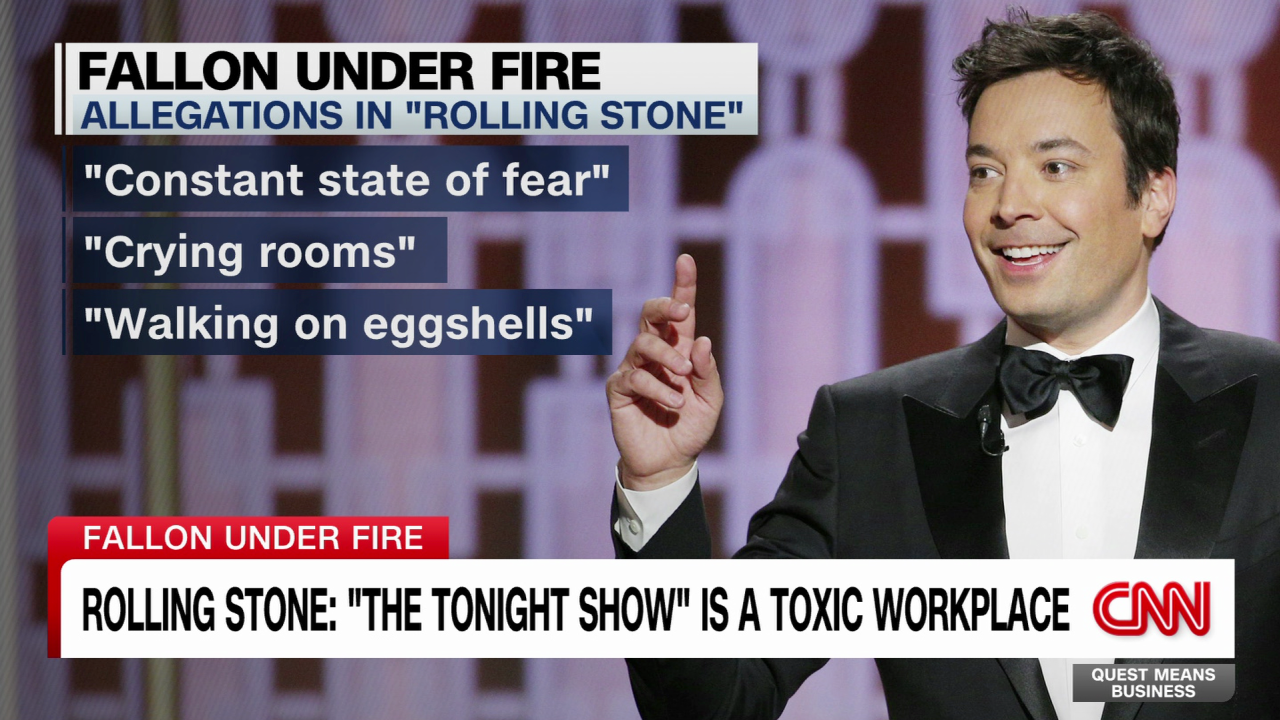
Sure! Here’s an expanded version of the article discussing Oliver Darcy’s conversation with Eleni Giokos about the Rolling Stone article accusing Jimmy Fallon of fostering a toxic workplace:
Oliver Darcy and Eleni Giokos Discuss the Rolling Stone Allegations Against Jimmy Fallon
In a recent discussion between Oliver Darcy and Eleni Giokos, the spotlight was cast on a troubling Rolling Stone article that has ignited significant controversy in the entertainment world. The piece in question accuses the popular talk show host Jimmy Fallon of creating a toxic work environment at “The Tonight Show Starring Jimmy Fallon.” Darcy, a prominent media reporter, and Giokos, an experienced journalist and anchor, delve into the specifics of these allegations and explore the broader implications for Fallon, his show, and the media industry as a whole.
The Rolling Stone article, published earlier this month, paints a damning picture of Fallon’s behavior behind the scenes. It claims that employees at “The Tonight Show” have endured a work culture marked by extreme stress, public humiliation, and erratic behavior from Fallon himself. The article highlights multiple accounts from current and former employees who describe a pervasive sense of fear and anxiety associated with their work environment.
Darcy and Giokos began their discussion by examining the core accusations. The Rolling Stone article features testimonies from numerous anonymous sources who allege that Fallon’s unpredictable mood swings and harsh criticism created an atmosphere of instability. One former employee recounts an incident where Fallon allegedly berated staffers in a manner that was both public and humiliating. Another source claims that the constant pressure to meet Fallon’s high expectations led to significant burnout and mental health issues among the team.
Darcy notes that while the allegations are serious, they are not entirely unprecedented in the world of entertainment. “This isn’t the first time we’ve seen high-profile figures accused of creating toxic work environments,” he observes. “But what makes this case particularly striking is the sheer scale of the alleged issues and the prominence of the individual involved.”
Giokos agrees, adding that Fallon’s position as one of the most beloved figures in late-night television adds a layer of complexity to the situation. “Fallon has built a reputation as a friendly and affable host,” she explains. “So, when such allegations come to light, it challenges the public’s perception of him and raises questions about the true nature of his behavior behind the scenes.”
The conversation then shifts to the response from Fallon and NBC, the network that airs “The Tonight Show.” According to reports, Fallon has issued a statement acknowledging the concerns raised but denying any intent to create a harmful work environment. NBC, on the other hand, has reportedly conducted an internal review and is said to be taking the allegations seriously.
Darcy emphasizes the importance of NBC’s response in addressing the issue. “It’s crucial for NBC to demonstrate that they are taking these allegations seriously and are committed to ensuring a safe and supportive work environment,” he says. “The network’s actions in the coming weeks will be closely watched, and their handling of the situation could have significant repercussions for their reputation and for Fallon’s future on the show.”
Giokos points out that this situation highlights a broader issue within the entertainment industry. “There’s a growing awareness and sensitivity around workplace culture and the treatment of employees,” she notes. “The industry is at a crossroads where it must confront and address toxic behaviors more transparently.”
The discussion also touches on the impact of these allegations on Fallon’s public image and the future of “The Tonight Show.” Fallon has long been known for his warm and approachable persona, but the Rolling Stone article challenges this image. Darcy suggests that the fallout from these accusations could potentially affect Fallon’s career and the show’s popularity. “If the allegations prove to be true and the public perceives Fallon in a different light, it could have significant consequences for his brand and for the show’s standing,” he says.
Giokos concurs, adding that the situation could also prompt a wider examination of workplace practices in the entertainment industry. “This is an opportunity for the industry to reflect on its culture and make meaningful changes,” she asserts. “It’s important for all stakeholders to learn from this situation and work towards creating healthier and more supportive work environments.”
As the conversation draws to a close, Darcy and Giokos acknowledge that the full extent of the allegations and their implications will unfold in the coming weeks and months. The Rolling Stone article has certainly set the stage for a larger conversation about workplace culture, accountability, and the responsibilities of those in positions of power.
In summary, Oliver Darcy and Eleni Giokos provide a comprehensive overview of the accusations against Jimmy Fallon as detailed in the Rolling Stone article. Their discussion highlights the seriousness of the allegations, the response from Fallon and NBC, and the broader implications for the entertainment industry. As the situation continues to develop, it remains to be seen how it will affect Fallon’s career, the future of “The Tonight Show,” and the industry’s approach to workplace culture.
This expanded version offers a detailed exploration of the discussion between Darcy and Giokos, providing insight into the allegations, responses, and broader implications.
Leave a Reply